Personality
Psychological Characteristics of Owners of Aggressive Dog Breeds
Owners of high-risk dogs have different personality charicteristics.
Posted March 16, 2009 Reviewed by Ekua Hagan

Back in 1996, I conducted a study of over 6000 people in which I was able to show that a person’s personality predicted the breed of dog that they would most likely select and would be happy with. The data from that study formed the basis of my book, Why We Love the Dogs We Do.
It also stimulated the thinking of some psychologists and some decided to look specifically at the personality characteristics of dog owners who chose dog breeds with a high risk for aggression. Such dog breeds are often labeled as “vicious.”
Definitions of a vicious dog vary among municipalities. Most animal control ordinances define a dog as “vicious” when the dog, without provocation, has bitten a human being or killed or maimed a domestic animal or if the dog is believed to be of a breed that has a high probability of such aggression. In addition, some breeds, namely Pit Bulls, may qualify as “vicious dogs” simply by reputation, not because a specific dog has behaved in a harmful manner.
Obviously some dogs do bite people and injuries caused by dog bites result in nearly one billion dollars worth of insurance claims annually. For this reason, insurance companies have used statistics gather by the U.S. National Center for Health Statistics and other sources of research to designate the breeds at the highest risk for biting.
Based on this data, many insurance companies refuse to issue homeowners insurance to owners of specific breeds of dogs considered ‘‘vicious’’ or at high risk of causing injury. The six breeds or types of dogs most commonly identified as high risk for aggression are the Akita, Chow Chow, Doberman Pinscher, Pit Bull (usually includes Staffordshire Bull Terriers, American Pit Bull Terriers, and American Staffordshire Terriers), Rottweiler, and Wolf-hybrids.
In 2006, Jaclyn Barnes led headed a team of researchers in Cincinnati which looked at the behaviors of owners of high risk for aggression dog breeds. Specifically, they collected data from the Hamilton County Clerk of Courts in Ohio looking for evidence of criminal convictions.
A total of 166 owners of high-risk dogs were compared with 189 owners of low-risk dogs. The high-risk dog owners had nearly 10 times more criminal convictions than other dog owners. Breaking the data down by categories of criminal behavior, they found that high-risk dog owners were 6.8 times more likely to be convicted of an aggressive crime, 2.8 times more likely to have carried out a crime involving children, 2.4 times more likely to have perpetrated domestic violence, and 5.4 times more likely to have an alcohol-related conviction when compared to low-risk dog owners.
Since criminal behaviors are most often associated with particular personality patterns, it was inevitable that some researchers would take the next step and determine if ownership of dog breeds that were considered to be high risk for aggression is associated with particular personality characteristics as well. Sure enough, a psychologist, Laurie Ragatz, led a team of researchers from West Virginia University and they have recently published their study in The Journal of Forensic Sciences.
In the West Virginia study, data was collected from 869 college students who completed an anonymous online questionnaire. It asked them about the type of dog that they owned, their history of criminal behaviors, and attitudes towards animal abuse. In addition, it took some measures of their personality, including any some measures that are often associated with psychopathic tendencies. It's only a correlational study but the results are thought-provoking.
The first thing to note is that this recent research seems to confirm the earlier study by the Cincinnati team. A significant difference in criminal behavior was found based on dog ownership type. Owners of high-risk dog breeds were significantly more likely to admit to violent criminal behavior, compared to large dog owners, small dog owners, and people who did not own dogs. The high-risk dog breed owner sample also reported that they engaged in more types of criminal behavior compared to all other participant groups of criminal behavior (i.e., violent, property, drug, and status).
The interesting addition to our knowledge that this study provides has to do with the personality characteristics of the high-risk dog owners. In general, high-risk dog breed owners were significantly more likely to engage in sensation seeking and risky behaviors. As a group, they were also more careless, selfish, and had stronger manipulative tendencies. They also seemed to engage in more self-defeating behaviors than low-risk dog owners.
One final distressing finding suggests that the high risk for aggression dog breed owners did not appear to be as well bonded to their dogs as the other groups of dog owners. This conclusion comes from the fact that their attitudes were much more accepting of the maltreatment or abuse of animals than was found for owners of low risk for aggression dog breeds.
Obviously this is just a correlational study, so one cannot conclude that all owners of high risk for aggression dogs show these negative personality characteristics. Take for example Helen Keller, the deaf-blind advocate for the handicapped, who also owned an Akita. Walt Disney, Sigmund Freud, and actress Uma Thurman all owned Chow Chows, while comedian Mel Brooks owned a Staffordshire Bull Terrier. None of these individuals appears to demonstrate criminal tendencies nor psychopathological personality characteristics. Still, it is interesting that a higher percentage of people with certain negative behavioral and personality characteristics do seem to be attracted to owning dog breeds that are of higher risk for aggression.
Stanley Coren is the author of many books, including Modern Dog.
Copyright SC Psychological Enterprises Ltd. May not be reprinted or reposted without permission.




